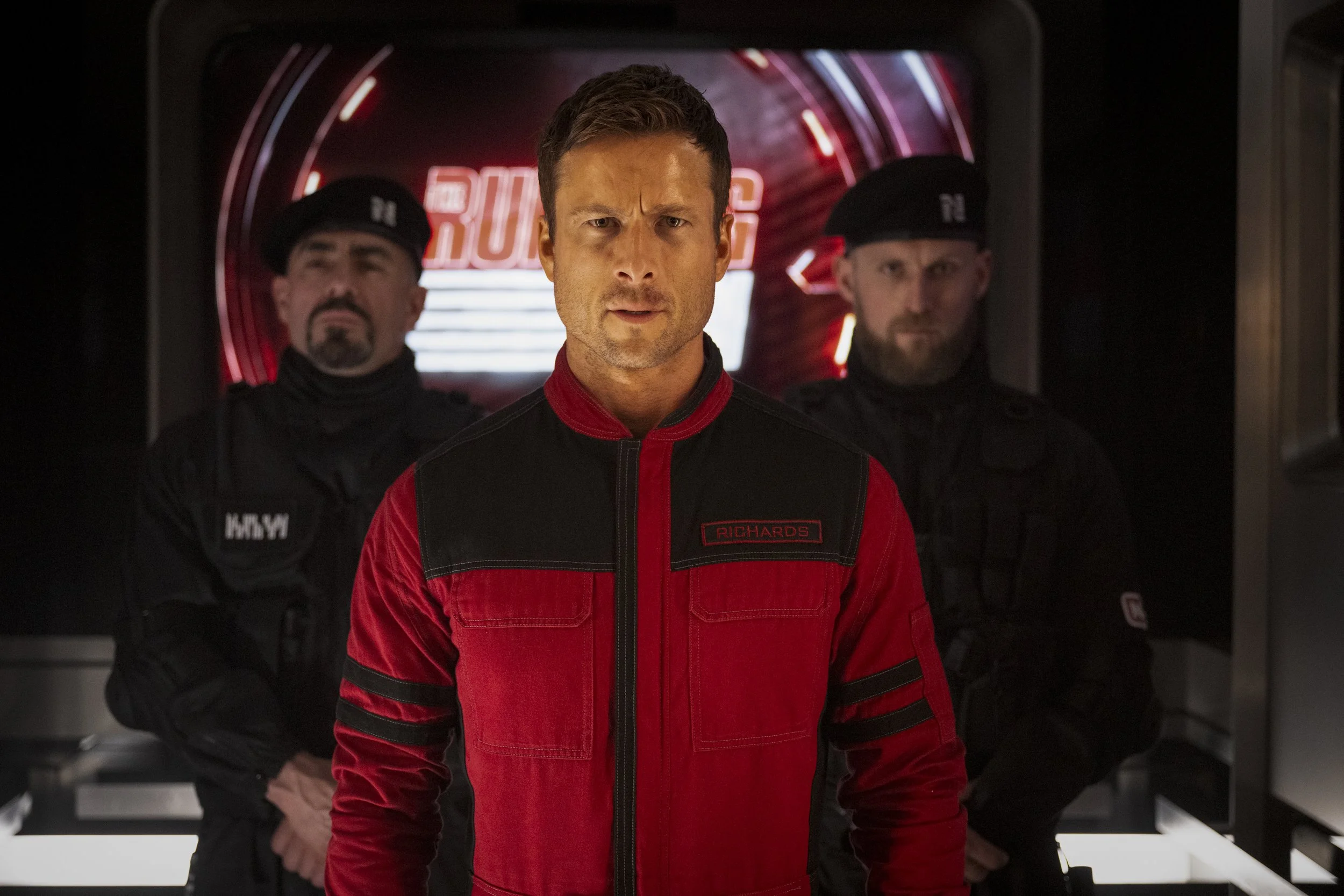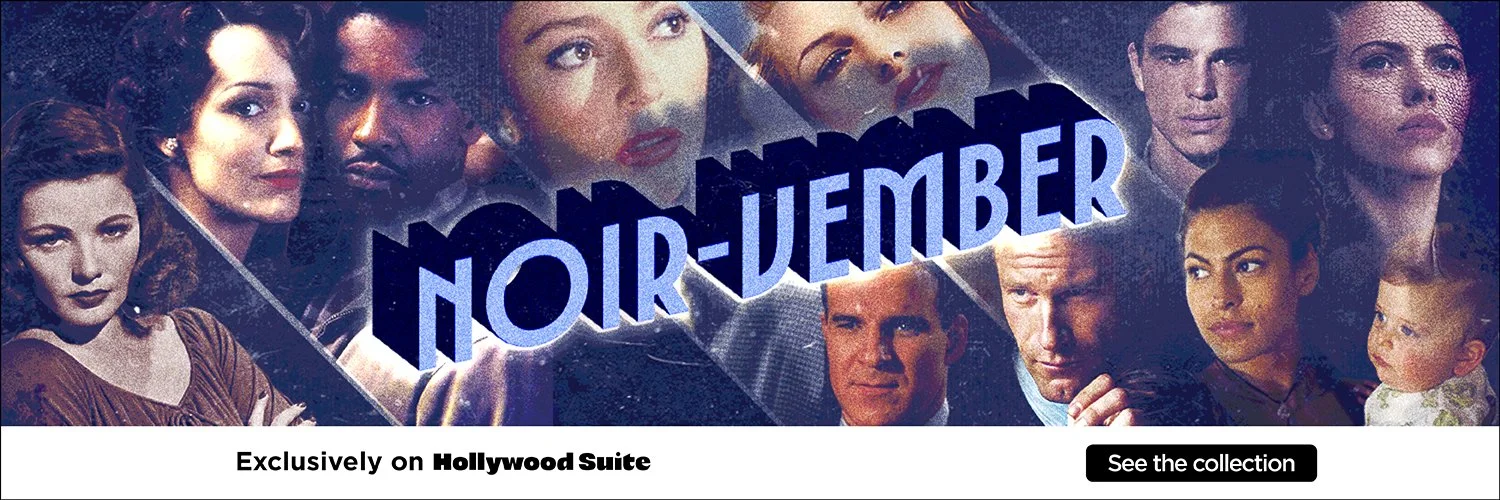The Running Man: A Good Run, But Not Wright’s Fastest
By Thom Ernst
B-
Edgar Wright has always worked best with a slight tilt. His films come at you from the side, as though he’s sneaking up with a grin.
From The Three Flavours Cornetto Trilogy (for the uninitiated: Shaun of the Dead, Hot Fuzz, The World’s End) to the time-spinning haunted flat of Last Night in Soho, Wright’s cinema tends to feel like you’ve wandered into a video store where the clerks are film scholars and the staff recommendations wall could double as a graduate thesis.
Which is why The Running Man arrives as something of a surprise — not unwelcome, just surprisingly stilted coming from a director who usually spikes his films with a shot of genre-bending mischief.
Glen Powell is the title character in The Running Man
Instead of re-weaponizing Arnold Schwarzenegger’s 1987 spandex-and-one-liners dystopia, Wright goes back to Stephen King’s original novel — the Bachman book King wrote in 1973, set in 2025, and released in a year that expected cars to fly but only got cars with keyless entry. Wright’s fidelity to King isn’t merely respectful; it’s bordering on reverent.
And in a neat bit of cosmic choreography, he releases the film in the very year King set it. 2025, baby! The future has arrived. Although mercifully without the televised execution lottery.
Rumour has it that King is pleased, which is already a story in itself. This is the same Stephen King who famously dismissed Kubrick’s The Shining — the cinematic equivalent of complaining your solid-gold gift wasn’t wrapped nicely. King loves film—or so he says—but is often the first to dismiss screen versions of his stories. So, Wright earning his approval is no small triumph. It might even be the film’s biggest.
But here’s where things get tricky: Wright’s devotion to King’s text may also be what keeps The Running Man from taking off. Wright is a director known for invention. His signature sharp edits, sly humour, layers upon layers of visual commentary feel muted here, as though King might be watching over his shoulder with a red pen.
The film keeps a respectful distance from director Paul Michael Glaser’s ’87 version — save for a couple of Easter-egg nods — and that’s understandable. The original has grown into an unlikely cultural artifact, thanks mostly to Schwarzenegger’s supernova presence and a villains’ row that included Jesse Ventura. Trying to compete with the ’87 film’s gonzo charm is a fool’s errand. Wright wisely doesn’t try.
Instead, he casts Glen Powell as Ben Richards, closer to King’s vision: a wounded everyman, not a monosyllabic action figure. Powell gives Richards a raw humanity — less super-human, more super-humanity. Richards is a family man, honest and upstanding in a world that honours obedience. He is a man with his back up against an Orwellian wall. With a sick daughter and no income, Richards signs up to be a contestant on The Running Man. It’s a game show no contestant has won.
Opposite him is Josh Brolin as Dan Killian, the game-show producer with a handshake so smarmy you’ll want to disinfect after.
Wright paints a world split in two: Them — the pristine, ivory-tower elites who stroll through white corridors as if allergic to dirt. Us — the fringe-dwelling masses, packed into decaying factories and flop houses like extras from a NIN (Nine Inch Nails) video.
Where the film crackles is in its supporting weirdness — notably Michael Cera, who shows up as a government holdout living with his outrageously deranged (and maybe inappropriately hilarious) mother, played by Sandra Dickinson. These scenes feel like pure Wright: off-handed, oddball, delightful in all the crooked ways his films tend to be.
There are other pleasures: cameos from William H. Macy, Martin Herlihy, and Sean Hayes add a dose of fun. The game-show structure remains intact, though the film is essentially a road movie, moving from one encounter to another, violence often glimpsed only through network-approved snippets. It’s an intriguing choice — though one that robs the story of immediate impact.
The real issue is that The Running Man occasionally feels like it’s been designed to avoid the touches Wright usually brings. It hesitates where his other films rush in. It broods where he typically winks. At times, it drifts into B-movie action territory but without the over-the-top swagger that makes B-movies charming. There are hints of Carpenter’s Escape From New York, though the villains here feel stamped out by the Office of Government-Issued Clichés.
By sticking tightly to the novel, Wright may have crafted a faithful adaptation ofThe Running Man. But in doing so, he’s also constructed one of his least inventive films. It’s a noble effort but the risk of devotion is that fidelity can look a lot like caution.
And perhaps that’s the final twist: If The Running Man falters, the fault may not lie with Wright at all, but with King’s novel, a dystopia whose grimness leaves little oxygen for the kind of tilted, counter-culture fun Wright usually thrives on.
Wright may have made The Running Man the way he and King always wanted — just not necessarily the one we expected.
The Running Man is directed by Edgar Wright and stars Glen Powell, Josh Brolin, Michael Cera, William H. Macy, Martin Herlihy and Sean Hayes. The Running Man opens in theatres Friday, November 14.


